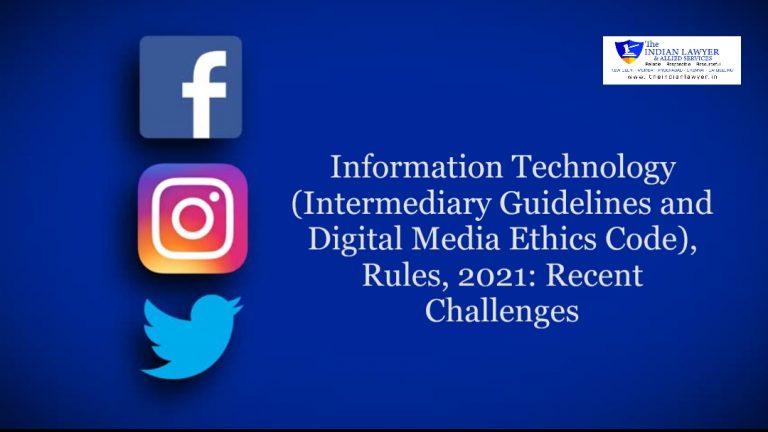INFORMATION TECHNOLOGY (INTERMEDIARY GUIDELINES AND DIGITAL MEDIA ETHICS CODE), RULES, 2021: RECENT CHALLENGES
Information Technology (Intermediary Guidelines and Digital Media Ethics Code), Rules, 2021 (“#InformationTechnologyRules, 2021”) have been notified vide Notification dated 25-02-2021 by the Ministry of Electronics and Information Technology (“#MEIT”). The Information Technology Rules, 2021 was framed in exercise of powers under Section 87 (2) of the Information Technology Act, 2000 (“#I.T. Act”) and in supersession of the earlier Information Technology (Intermediary Guidelines) Rules 2011, which came into effect from 26-05-2021.
The basic idea of the Information Technology Rules, 2021 is implementation of new responsibilities on internet intermediaries, which enjoy the legal immunities under Section 79 of the I.T. Act. Earlier, the law gave internet intermediaries to enjoy unprecedented and wide-ranging immunity from legal liability.
The purpose of the Information Technology Rules, 2021 mandates a grievance redressal system for over the top (OTT) and digital portals in the country. OTT refers to a streaming service that delivers content over the internet. It further empowers a user of social media by establishing a three-tier redressal mechanism for efficient grievance resolution.
The Information Technology Rules, 2021 requires internet intermediaries, especially “significant social media intermediaries” which includes Facebook, YouTube and WhatsApp to earn the privilege of legal immunity under Indian law by discharging certain duties and responsibilities. These duties relate to the creation of a functional grievance redressal mechanism on the platform for a user to report any misuse.
It provides for special expedited take down procedures for restricting spread of revenge sexually explicit content on digital media. Furthermore, the appointment of India based compliance officers, traceability requirements for certain specific purposes, deployment of automated filtering software, identification of a physical address for the purpose of service of legal notices, a right of users to seek verification of their accounts, etc., are the other important focus areas of the new Information Technology Rules, 2021.
Therefore, if an internet intermediary declines to abide by these new responsibilities, they lose the immunities offered under Section 79 of the I.T. Act, making them legally liable for the acts of third parties on their platform.
There are several objections and challenges that have been raised by the big social media intermediaries such as Facebook, YouTube and WhatsApp regarding the constitutionality of the Rules framed under the Information Technology Rules, 2021.
The Facebook-owned Platform i.e. WhatsApp is likely to challenge the constitutional validity of Rule 4(2) of the Information Technology Rules, 2021 before the Delhi High Court in WhatsApp LL.C v Union of India (2021). Rule 4(2) provides that intermediaries like WhatsApp have to enable “the identification of the first originator of the information” in India on their end-to-end encrypted messaging services (commonly referred to as “traceability”), upon Government or Court order. It is contented that the requirement under Rule 4(2) necessitates WhatsApp to break end-to-end encryption on its messaging service, as well as the privacy principles underlying it. It infringes upon the fundamental rights to privacy and freedom of speech of the hundreds of millions of citizens using WhatsApp to communicate privately and securely. Hence, WhatsApp seeks the High Court to declare that Rule 4(2) of the Information Technology Rules, 2021 is violative of Articles 14, 19(1)(a), 19(1)(g), and 21 of the Constitution, ultra vires the I.T. Act, and illegal. It further seeks to safeguard from criminal liability for non-compliance with the Rule 4(2) of the Information Technology Rules, 2021.
Moreover, the three-month window granted by the Central Government to social media platforms such as Facebook, Twitter, and others to comply with the new social media rules was ended on 25-05-2021. The consequences of non-compliance under the Information Technology Rules, 2021 could result in ban of such social media giants if they do not implement the said Rules. They also run the risk of losing their status as “Intermediaries” and may become liable for criminal action as per the Information Technology Rules, 2021.
While various experts have lauded the steps taken by the Government to mitigate and penalize child sexual abuse and sexually explicit content on digital media, however, various other digital media houses are likely to challenge the constitutional validity of the Information Technology Rules, 2021 to the extent that it violates the fundamental right to privacy, freedom of speech, and freedom to trade.
Lakshmi Vishwakarma
Senior Legal Associate
The Indian Lawyer & Allied Services





































Leave a Reply